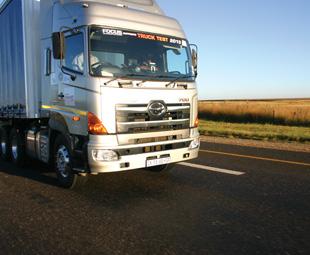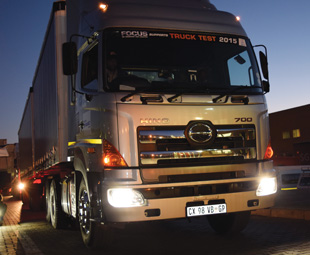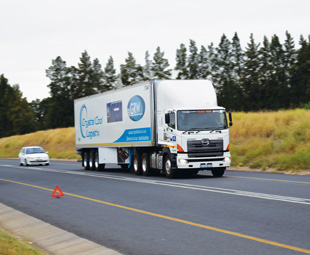More than just a test!

According to Hino South Africa’s Gert Agenbag, senior manager for sales, and Leslie Long, senior manager for marketing and demand planning, companies would be daft not to enter what they can in the Truck Test events … this isn’t only a marketing exercise, but a product development and planning opportunity as well.
Long points out that there are two reasons why Hino has been involved with the Truck Test events since 2012: “The first is to show the market how competitive our products are, and the second is to learn more about how our trucks perform on South African roads.” He emphasises that it isn’t only an exercise in marketing, but also one in product development and planning.
Agenbag adds: “I think the test has become more professional, more accurate and more user friendly for us as competitors – comparing it to the first year in 2012, where the same type of vehicles participated. I really think that there have been huge improvements – hats off to the organisers.”
This year the company entered two vehicles; the Hino 700 450, and the 700 480. “We entered the two models in our range that are most suited to the trailer configurations that were used in this year’s test,” Long explains. “The 450 is suited to the reefer application, and the 480 to the interlinks.”
 Agenbag continues: “Those applications are quite significant, as they represent the two main categories in the extra-heavy segment. To enter only one doesn’t make sense. When you participate, you might as well go all in.”
Agenbag continues: “Those applications are quite significant, as they represent the two main categories in the extra-heavy segment. To enter only one doesn’t make sense. When you participate, you might as well go all in.”
He recounts a conversation that he had with Long: “I told Leslie that, in this type of test, we would be sending the wrong message if we didn’t enter all the vehicles we have in a certain range. It might come across that we don’t want to highlight a vehicle’s performance, or that it can’t handle the application.”
Agenbag emphasises that if a particular vehicle isn’t entered into a specific category, it could indicate a weakness. “In the first year’s test we entered only one vehicle, last year we had three and, to be honest, going forward, I don’t think Hino will not take part in any category. We are an all-inclusive type of brand. We don’t just sell one type of truck.”
He adds that it is important to participate to the fullest. “If there is a range, you might as well enter all of them. What message are you sending to your customers if you don’t?”
Long commends the organisers of this year’s event (specifically Adrian van Tonder, senior manager of RTMS and PBS at Barloworld Logistics) for the fact that the progress of the vehicles was kept a secret during the test. “It added to the excitement of it all,” he tells FOCUS. “Last year’s Truck Test was a different story … everybody knew how everyone else was doing, and exactly where their truck lay – there weren’t really any surprises when the results were announced.”
 This had another drawback, apart from removing all suspense. Agenbag explains: “While the knowledge of how other manufacturers were doing helped with some rivalry, it added some unpleasantness as well.
This had another drawback, apart from removing all suspense. Agenbag explains: “While the knowledge of how other manufacturers were doing helped with some rivalry, it added some unpleasantness as well.
“It is better to keep everyone in the dark, as this eliminates altering of strategies, resulting in a better representation of normal operations and a better atmosphere during the test.”
Agenbag is also glad that the Gerotek track day wasn’t part of this year’s test. “The track day doesn’t really show anything, other than what skills your drivers have,” he tells FOCUS. “I have always maintained that, as far as I’m concerned, the whole day at Gerotek is a waste of time. I want to see trucks operating in normal conditions on the road, and that is what we did this year.”
Another benefit was staying over for the night and then driving back the next morning. “It is less tiring for us,” says Agenbag. “It is also less stressful to stay over, and move and operate as a team.”
Agenbag continues: “I really hope that, in the future, the organisers stick to this format; where you drive out on the first day and you drive back the next day, in real conditions.
“It is also great to see other industry players and to talk to people that you don’t get to see every day. It really is a good experience.”
The duo also have an interesting suggestion for a future event … “It would be great if a future Truck Test could be devised where only some parameters are provided – a starting point, an end point and a load. Then the manufacturer should decide which category of truck, which body and what configuration to use to move that load,” Long relates with excitement.
“It is more a simulation of actual business,” Agenbag adds. “What Leslie is saying is such a valuable suggestion. We can continue to keep running these tests, but, at some point, it is going to become irrelevant. In South Africa, the average lifespan of a truck is between 12 and 16 years, so how many times can we test the same vehicles over and over again?”
Long gives an example to prove why he thinks an operational test would work better: “Sugar cane could be transported using one of two options; you can either go the truck tractor/interlink route, or you can use a freight carrier with a drawbar … Both of them work, but, in some operations, your truck tractor option is more effective, and, in another, a freight carrier is the answer. There is always more than one solution for any transport job.”
Agenbag concludes: “Business isn’t just about the trucks that you put out there, it is about providing solutions … All the original equipment manufacturers see themselves as partners to business. We don’t only want to come up with a steel and rubber solution, we want to provide a tool that can make our customers money. That is what we are all trying to do. So why not test that ability and not only our ability to bend and weld steel?”
Could this be the beginning of Truck Test 2016?
Watch this space.
Published by
Focus on Transport
focusmagsa




